

The 1980s Republican roots of Hillary Clinton’s early voting strategy. Despite extensive coverage of early voting as a campaign tool this election cycle, it is not a wholly new phenomenon.
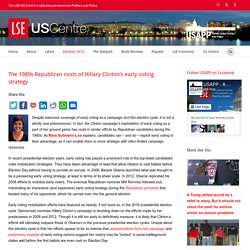
In fact, the Clinton campaign’s exploitation of early voting as a part of her ground game has roots in similar efforts by Republican candidates during the 1980s. As Mara Suttmann-Lea explains, candidates can – and do – exploit early voting to their advantage, as it can enable them to more strategic with often limited campaign resources. In recent presidential election years, early voting has played a prominent role in the top-ticket candidates’ voter mobilization strategies. They have taken advantage of laws that allow citizens to cast ballots before Election Day without having to provide an excuse. In 2008, Barack Obama launched what was thought to be a pioneering early voting strategy, at least in terms of its sheer scale. Revenge of the White Working-Class Woman. If you’ve read anything about this unprecedented 2016 campaign, you know this: Donald Trump’s solid core of support comes from white working-class America.

As the blue-collar voter has become central to the political conversation, a clear picture of who we’re talking about has emerged: He’s likely male and disillusioned with the economy and loss of industry. Dark-Money Groups: Hey, We're Just Like '50s Civil Rights Activists in Alabama! Gene Herrick/AP What do billionaire brothers Charles and David Koch have in common with civil rights pioneers of the 1950s?
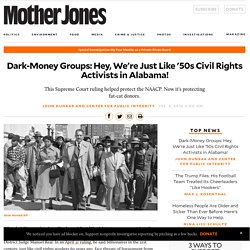
More than you might think. At least according to US District Judge Manuel Real. In an April 21 ruling, he said billionaires in the 21st century, just like civil rights workers 60 years ago, face threats of harassment from those who disagree with their views and should therefore be entitled to privacy when it comes to disclosing certain kinds of information to the government. How to Win a Debate With Mind Games and Dirty Tricks. Before the cameras go live at the presidential debate on on Monday night, the mind games have already begun.

The telegraphed punches, false tells, attempts to get inside the other candidate’s head. Every great competitor has his or her trick of choice—an unexpected move to rattle their opponents and throw them off their game. Story Continued Below. Nearly a Quarter of Americans Say Presidential Debates Could Sway Their Vote. Nearly a quarter of Americans say the candidates' performances in the upcoming presidential debates may have a major impact on their vote in the November election.
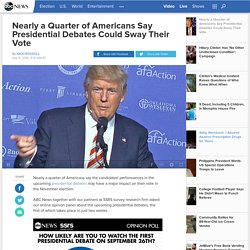
ABC News together with our partners at SSRS survey research firm asked our online opinion panel about the upcoming presidential debates, the first of which takes place in just two weeks. Almost one-fourth of respondents, 23 percent, said they expect the debates between Democratic nominee Hillary Clinton and Republican nominee Donald Trump to have a major impact on their choice for president. Iowa caucuses: Here’s how the voting works.
They're almost here.
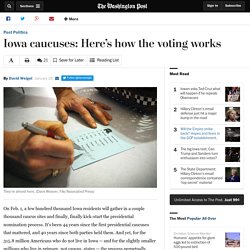
(Dave Weaver, File/Associated Press) On Feb. 1, a few hundred thousand Iowa residents will gather in a couple thousand caucus sites and finally, finally kick-start the presidential nomination process. It's been 44 years since the first presidential caucuses that mattered, and 40 years since both parties held them. How the Iowa Caucuses Work. Everything you need to know about how the presidential primary works. Caucus participants place their votes in a basket at the local community center in downtown Rock Rapids, Iowa on January 3, 2012.
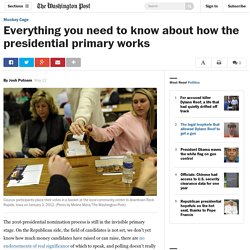
What Makes a Presidential Résumé? Nineteen former members of the American workforce are running for president—including a pastor, a horseshoer, and a documentary filmmaker.
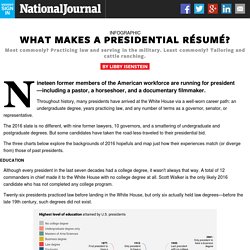
Throughout history, many presidents have arrived at the White House via a well-worn career path: an undergraduate degree, years practicing law, and any number of terms as a governor, senator, or representative. The 2016 slate is no different, with nine former lawyers, 10 governors, and a smattering of undergraduate and postgraduate degrees. But some candidates have taken the road-less-traveled to their presidential bid. The three charts below explore the backgrounds of 2016 hopefuls and map just how their experiences match (or diverge from) those of past presidents. Although every president in the last seven decades had a college degree, it wasn't always that way.
Twenty-six presidents practiced law before landing in the White House, but only six actually held law degrees—before the late 19th century, such degrees did not exist. It’s not just Trump: Voter anger fuels outsider candidates. This has become the summer of the political outsider, as a cast of interlopers upend and dominate the presidential nominating process in both parties.
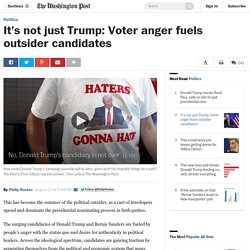
The surging candidacies of Donald Trump and Bernie Sanders are fueled by people’s anger with the status quo and desire for authenticity in political leaders. Across the ideological spectrum, candidates are gaining traction by separating themselves from the political and economic system that many everyday Americans view as rigged against them. “There are a lot of voters who are exceptionally frustrated with traditional politics and politicians and who quite simply feel failed by the system,” said pollster Geoff Garin, who advises Priorities USA Action, a super PAC supporting Democratic front-runner Hillary Rodham Clinton.